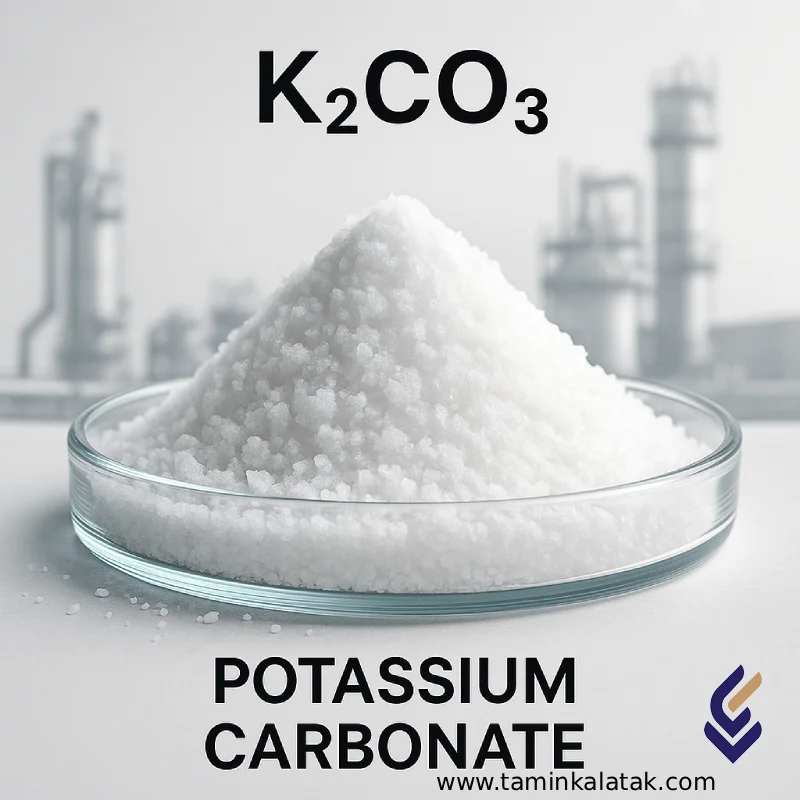Potassium carbonate
Potassium carbonate is an important inorganic salt with the chemical formula K₂CO₃. It is available as a white, odorless powder or crystalline solid which is highly hygroscopic. Due to its high water solubility, strong alkalinity, and chemical stability, potassium carbonate finds a wide range of applications — from glass manufacturing to pharmaceuticals.
Chemical Structure of Potassium Carbonate
Potassium carbonate is an alkaline ionic salt comprised of two potassium ions (K⁺) and one carbonate ion (CO₃²⁻). In its solid state, it crystallizes in an anhydrous monoclinic structure. In aqueous solution the liberated potassium and carbonate ions confer strong alkaline characteristics and high pH, thereby functioning as a powerful base.
Physical and Chemical Properties
-
Chemical formula: K₂CO₃
-
Molecular weight: ~205 g/mol
-
Density: (Note: the figure “43 g/cm³” seems incorrect in original text — likely 2.43 g/cm³ or a mis-print)
-
Melting point: approx. 891 °C
-
Boiling/decomposition point: above 1,200 °C
-
Solubility in water (20 °C): 1,120 g/L – very high
-
Physical appearance: white powder or granules, odorless
-
pH of 10% solution: around 6 (Note: this is surprisingly low — may vary by grade)
-
Stability: stable under normal conditions, but highly hygroscopic
-
Flammability/explosion hazard: non-flammable and safe in normal conditions
Production Methods
Historically, potassium carbonate was made from wood ash. Today, industrial production is achieved via:
-
CO₂ reaction with potassium hydroxide (KOH):
2 KOH + CO₂ → K₂CO₃ + H₂O
After evaporation and crystallisation, high-purity K₂CO₃ is obtained. -
Electrolysis of potassium chloride (KCl):
First, KOH is generated by electrolysis of KCl. Then KOH reacts with CO₂ to yield K₂CO₃. This modern process is widely adopted in large-scale industries due to its high efficiency. -
Traditional method: Extraction from wood and plant ash – largely obsolete due to low yield and impurities.
These modern methods enable production of industrial or food-grade potassium carbonate with uniform granulation and high purity.
Applications of Potassium Carbonate
-
Glass Industry: Lowers melting point of glass, improves clarity and durability.
-
Detergent/Soap Industry: Serves as an alkaline agent in liquid soap and industrial cleaning formulations.
-
Food Industry (Food Additive E501): Functions as a pH regulator, stabiliser and anti-acid. Used in alkaline cocoa processing, instant noodles, carbonated drinks.
-
Chemical Fertiliser Production: A soluble source of potassium for agriculture and hydroponics.
-
Ceramic & Glaze Industry: Lowers firing temperatures and improves surface quality of glazes.
-
Metallurgy: Used as a flux, metal refining aid, and lubricant in metal smelting operations.
-
Firefighting: Ingredient in dry chemical extinguishers and fire-suppressant compositions.
-
Pharmaceuticals: Employed as a buffer and pH adjuster in selected formulations.
-
Textiles: Used in finishing and colour-fixing for natural and synthetic fibers.
Advantages of Potassium Carbonate
-
Very high solubility → enables concentrated industrial solutions.
-
Provides a rich source of potassium → crucial in agriculture and food sectors.
-
Chemically stable → long shelf life under proper storage.
-
Versatile across many industries: glass, metal, food, pharmaceutical, etc.
-
Safer alternative in some cases compared to stronger alkalis like KOH.
Limitations
-
Strong alkalinity → direct contact with skin or eyes may cause irritation or burns.
-
Hygroscopicity → demands moisture-proof packaging and dry storage.
-
Highly alkaline → may corrode metals and sensitive equipment.
-
Dust inhalation hazard → may irritate respiratory tract; dust masks recommended.
Safety and Storage
-
Storage conditions: Store in a dry, cool, well-ventilated environment, protected from direct sunlight.
-
Protective equipment: Wear chemical-resistant gloves, safety goggles, and respiratory protection when handling dust.
-
Transport & packaging: Use moisture-resistant, durable packaging and comply with chemical transport regulations.
-
Emergency response:
-
Skin/eye contact: Rinse immediately with plentiful water, seek medical attention.
-
Dust inhalation: Move to fresh air; seek medical aid if symptoms persist.
-
Accidental ingestion: Do not induce vomiting; seek urgent medical care.
-
Summary
Potassium Carbonate (K₂CO₃) is a highly functional, white, water-soluble alkaline salt used widely across industrial, food, agricultural and chemical sectors. With strong alkalinity, high solubility and stability, it remains an indispensable raw material for glass production, detergents, fertilisers, food processing and more.
If you are looking to source industrial or food-grade potassium carbonate, we offer reliable supply, full documentation and competitive pricing. Contact our specialists today for expert guidance and current pricing.
Applications
| Applications | , , , , |
|---|
Potassium carbonate
| Products | CAS number | Grade | Vapor pressure | Physical appearance | Density (at 20°C) | Melting point | Solubility in water |
|---|---|---|---|---|---|---|---|
| Potassium Carbonate | 07/08/0584 | Industrial, laboratory, pharmaceutical and food (E501) | Negligible (practically zero at room temperature) | White, odorless solid, in powder or crystal form | 2.43 g/cm³ | About 891°C | Very soluble – 1120 g/L at 20°C |







